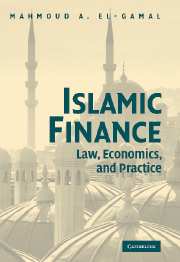Book contents
- Frontmatter
- Contents
- List of Illustrations
- Preface
- Glossary and Transliteration
- 1 Introduction
- 2 Jurisprudence and Arbitrage
- 3 Two Major Prohibitions: Riba and Gharar
- 4 Sale-Based Islamic Finance
- 5 Derivative-Like Sales: Salam, Istisna', and 'Urbun
- 6 Leasing, Securitization, and Sukuk
- 7 Partnerships and Equity Investment
- 8 Islamic Financial Institutions
- 9 Governance and Regulatory Solutions in Mutuality
- 10 Beyond Shari'a Arbitrage
- Conclusion
- Notes
- Bibliography
- Index
5 - Derivative-Like Sales: Salam, Istisna', and 'Urbun
Published online by Cambridge University Press: 06 July 2010
- Frontmatter
- Contents
- List of Illustrations
- Preface
- Glossary and Transliteration
- 1 Introduction
- 2 Jurisprudence and Arbitrage
- 3 Two Major Prohibitions: Riba and Gharar
- 4 Sale-Based Islamic Finance
- 5 Derivative-Like Sales: Salam, Istisna', and 'Urbun
- 6 Leasing, Securitization, and Sukuk
- 7 Partnerships and Equity Investment
- 8 Islamic Financial Institutions
- 9 Governance and Regulatory Solutions in Mutuality
- 10 Beyond Shari'a Arbitrage
- Conclusion
- Notes
- Bibliography
- Index
Summary
As we indicated in the previous chapter, existence of some property as the object of sale is generally a condition for contract validity. However, there are two notable exceptions that allow sales of nonexistent objects. The first is an ancient contract that predates Islam, called salam in the Hijaz area of western Arabia, wherein the Prophet lived, and salaf in Iraq, both terms meaning “prepayment.” This contract was primarily used for financing agricultural production and was legalized by the Prophetic traditions cited below. A similar contract, called istisnaʿ, meaning “commission to manufacture,” was legalized in later centuries, likewise to assist financing of nonagricultural (e.g., manufacturing) production.
In recent years Islamic financial practitioners have adapted the classical forms of salam and istisnaʿ and combined them with other transactions to generate approximations of conventional financial transactions, including interest-bearing loans, interest-bearing bills and bonds, build-operate-transfer and build-operate-own infrastructure and other project financing, etc. We start this chapter by reviewing the classical rules on salam and istisnaʿ and the innovative uses of those contracts that have been approved in recent years (not entirely without controversy) by various juristic bodies.
Prepaid Forward Sale (Salam)
All six major compilers of Prophetic tradition narrated on the authority of Ibn ʿAbbas that when the Prophet migrated to Madina (formerly known as the city of Yathrib), he found its inhabitants engaging in one-to-three-year forward sales of fruits, with prices being prepaid at contract inception (which gives salam = “prepayment sale” its name).
- Type
- Chapter
- Information
- Islamic FinanceLaw, Economics, and Practice, pp. 81 - 96Publisher: Cambridge University PressPrint publication year: 2006



